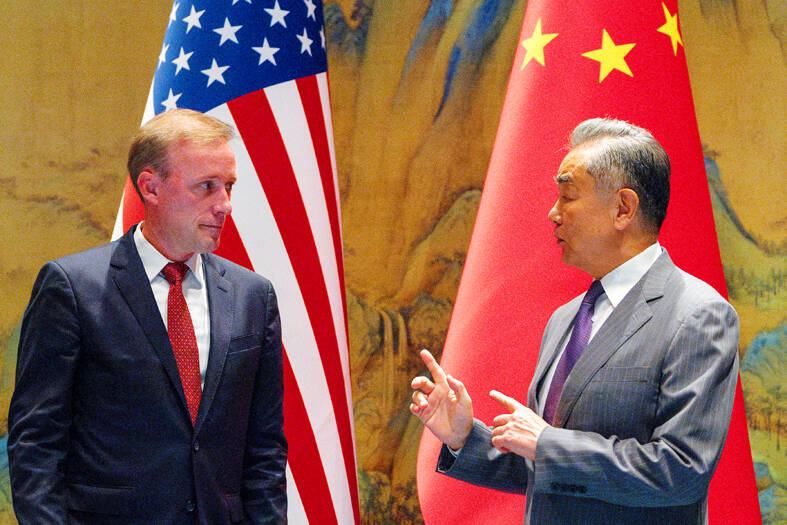Chinese Minister of Foreign Affairs Wang Yi (王毅) and US National Security Adviser Jake Sullivan discussed setting up new talks between their presidents in meetings aimed at managing the two nations’ difficult relationship.
“The two sides discussed a new round of interaction between the two heads of state in the near future,” the Chinese Ministry of Foreign Affairs said in a readout published yesterday evening, without saying how the communication would be conducted.
Wang repeated China’s positions on a range of contentious issues from its territorial claim over Taiwan to its objection to US curbs on its technology ambitions. The Chinese diplomat also expressed a desire to stabilize ties between the world’s two largest economies that frayed during the administration of US President Joe Biden.

Photo: Reuters
He urged the US to stop arming Taiwan and reasserted Beijing’s claims in the South China Sea, calling on Washington not to “condone violations” by the Philippines.
The remarks came after US Indo-Pacific Commander Admiral Samuel Paparo said the country was willing to accompany Philippine vessels during resupply missions in the disputed body of water amid recurring confrontations with Chinese ships.
Despite their differences, the two sides agreed to maintain high-level exchanges and cooperation in areas such as anti-narcotic enforcement, climate change and artificial intelligence, according to the readout.
Sullivan is the first US national security adviser to visit China since 2016. His trip comes months before the US presidential vote in November that pits US Vice President Kamala Harris against former US president Donald Trump. While both candidates are set to maintain a tough stance on the world’s No. 2 economy, the Republican has threatened a blanket 60 percent tariff on Chinese exports.
Biden and Chinese President Xi Jinping (習近平) last met at a summit in San Francisco in November last year, where they held talks that helped stabilize ties and rebuild a series of communication channels.
However, while Biden has repeatedly touted spending “more time” with Xi than any other world leader at “about 90 hours,” he is set to be the first US president since Jimmy Carter not to travel to China while in office, if he does not make it to the Asian nation before January.
Strict controls prevented travel to China during the COVID-19 pandemic, and saw Xi remain within his nation’s borders for years, severely curtailing his international travel agenda and removing the opportunity for face-to-face diplomatic exchanges.
Relations between the two superpowers plunged during that period, after then-US House of Representatives speaker Nancy Pelosi visited Taiwan in August 2022, causing Beijing to suspend military talks.
Other issues have hampered ties. Beijing has complained about US efforts to cut off China from advanced technology, including semiconductors, and the White House’s moves to work with allies on security and economic issues. Canada announced it would impose tariffs on Chinese-made electric vehicles, aluminum and steel hours before Sullivan arrived in Beijing.
Despite those frictions, Sullivan and Wang have met face-to-face every few months over the past few years as part of Biden’s push to keep open lines of communication, in a mechanism known as the “strategic channel.”

Taiwan last night blanked world No. 1 Japan 4-0 to win the World Baseball Softball Confederation’s (WBSC) Premier12 for the first time. Taiwanese ace Lin Yu-min (林昱珉) held defending champions Japan to just one hit and no runs in the first four innings, before catcher Lin Chia-cheng (林家正) opened the fifth inning with a solo home run. That was soon followed by a three-run homer from Taiwanese captain Chen Chieh-hsien (陳傑憲) to put Taiwan ahead in the prestigious tournament of the world’s top 12 baseball teams. In addition to a superb performance from 21-year-old Arizona Diamondbacks prospect Lin, three more Taiwanese pitchers

Taiwan yesterday advanced to the gold medal match of the World Baseball Softball Confederation’s (WBSC) Premier12 for the first time in history, despite last night losing 9-6 to Japan. Taiwan advanced after the US defeated Venezuela in the first game on the last day of the Super Round. However, the US had no chance of advancing to the championship game unless it defeated Venezuela by at least nine points. The US won 6-5. As a result, the two teams — who both had one win and two losses in the Super Round — are to face off again in the

Taiwan Semiconductor Manufacturing Co (TSMC, 台積電), the world’s biggest contract chipmaker, yesterday held an equipment installation ceremony for its first 2-nanometer fab in Kaohsiung, six months ahead of schedule, Kaohsiung Mayor Chen Chi-mai (陳其邁) said. “To cope with the strong global demand for advanced chips, TSMC is to start moving in equipment for its first-ever 2-nanometer fab half a year earlier than scheduled,” Chen said at an question-and-answer session at the Kaohsiung City Council. TSMC’s 2-nanometer process technology would help accelerate the development of artificial intelligence (AI) applications as well as the transformation of local industries in Kaohsiung, Chen said in a

BUDGET WOES: KMT lawmakers said they would propose cutting or eliminating the entire funding for the sub project, while a TPP legislator said she would opt to freeze it The harbor acceptance test (HAT) for the Hai Kun (海鯤), or “Narwhal,” an indigenous defense submarine (IDS) prototype, is nearly complete and the vessel is expected to be delivered to the navy before the end of next year as scheduled, the navy said yesterday. The HAT for the IDS prototype is 83 to 85 percent complete, Republic of China Navy Chief of Staff Vice Admiral Chiu Chun-jung (邱俊榮) told a meeting of the legislature’s Foreign Affairs and National Defense Committee. This would be followed by a sea acceptance test (SAT), which is expected to begin in April next year and conclude